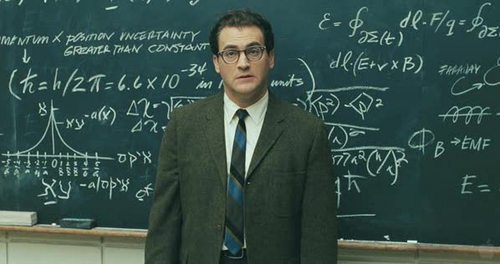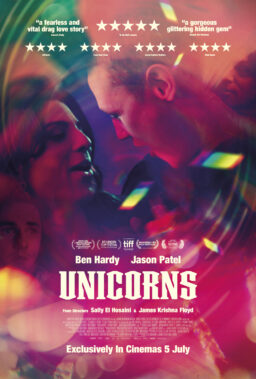Nobody makes movies as richly and densely composed as the Coens. I’ve said it before that when I’m watching one of their films it’s like being exposed to the distilled essence of cinema, and it makes me realize how anemic and unfocused most movies are. They pack a world of information into their words and images, but they also find the music within them. Their movies sing, every dimension in harmony or counterpoint with every other. Their soundtracks, created with the collaboration of sound designer Skip Lievsay and composer Carter Burwell, are the most vibrantly imagined anywhere. In “No Country for Old Men” they created soundscapes that served as the score, even though very little of it was actually music (beyond a few tones that almost subconsciously quiver beneath certain moments).
David Schwartz has a superlative interview with Carter Burwell at Moving Image Source, in which he talks about the thrilling sonic dimensions of “A Serious Man.” Burwell has worked with the Coens for a quarter century, and they’re all in tune with one another’s genius:
But for me, the film is really about a person who is balanced somewhere between life and death. Throughout the whole movie, death is hovering on the periphery. The metaphor of the movie is the first lecture that the university professor, Larry Gopnik, who is our main character, gives about Schrödinger’s cat, which is a thought experiment in which a cat is simultaneously dead and alive. It maintains that situation until you observe it to determine which it is. I see Larry as being in that situation himself, so the question for me as the composer is what can I do musically to suggest that. I found it was useful to have a motif that would repeat endlessly, to suggest that no matter what goes on in the film, he’s not really getting anywhere. He’s blocked at every point in his personal, professional, and spiritual life.
And there’s something about the delicacy of the harp that I think on the one hand seems sympathetic to this character’s travails, but on the other hand is a little bit funny, because in fact none of these characters reveals any delicacy whatsoever. In every way, they’re indelicate. One thing I enjoy about this harp motif is that it’s polyrhythmic: you can count it in three or you can count it in four. I personally enjoy that ambiguity. The piece is so repetitious, and yet you’re not sure where the bar lines are, so it’s kind of interesting. […]
I tried to put other things against that motif that didn’t quite fit with it. So there’s a piano melody that’s in a different meter than the harp piece. There’s also this very slowly moving chordal stuff underneath which is more dark. None of what I’ve said explains why this would be the right music for the movie. I tried other instrumentation that sounded like it bore some relationship to Jewish music, but anything like traditional Jewish music, like violin or clarinet, seemed to immediately tell you, “Oh, the surface is what we’re looking at. It’s a Jewish community and a guy who is having issues within that community.” That didn’t seem right to me…
The music itself demonstrates a sympathetic understanding of the movie’s themes, extending the film into uncanny dimensions.
In the rest of the “Behind the Music” interview, Schwartz and Burwell also discuss the latter’s work on “No Country for Old Men,” “Where the Wild Things Are,” “Twilight” — and other great scores and composers Burwell admires.
For an appreciation of earlier Coen/Burwell work, this time in an Irish key, here’s my ode to “Miller's Crossing“:











